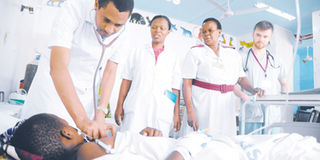Medical gamble that saved a little boy’s life

Innovative medics Dr Francis and his team at Muhimbili National Hospital in Dar es Salaam. PHOTO|FILE
What you need to know:
- The 18-month old boy was rushed to Muhimbili National Hospital (MNH) in Dar es Salaam where he was admitted. But his condition soon deteriorated into acute kidney failure.
- A dark cloud hovered over the family. The country’s biggest referral hospital has for years been infamous for being too ill-equipped to save those dying from such conditions.
Dar es Salaam. A few months after he was born, Abdul Mfaume suffered severe malnutrition and diarrhoea, triggering fear within his family that he may not survive.
The 18-month old boy was rushed to Muhimbili National Hospital (MNH) in Dar es Salaam where he was admitted. But his condition soon deteriorated into acute kidney failure.
A dark cloud hovered over the family. The country’s biggest referral hospital has for years been infamous for being too ill-equipped to save those dying from such conditions.
For days, Abdul could not pass a drop of urine. Poor feeding and severe diarrhoea had caused the complication.
Nurses rightly advised the mother, Ms Mwanaidi Muhidini, her best shot was getting the baby to India for treatment.
“It’s by a miracle that he is alive today. We looked at him lying on his hospital bed and struggled with the feeling that we may lose him,” the mother says.
It bordered on the adventurous. But that “miracle” was a last minute improvised procedure conducted by a daring medical doctor, assisted by a postgraduate medical student and some nurses.
Necessity turned out to be the mother of invention for a passionate Dr Francis Fredrick who daringly tried out a life-saving technique that had never been applied to any child in the history of medical care at the MNH Paediatric Unit.
‘Miraculous escape’
The result of that experiment is now contained in the Journal of Medical Case Reports, which published young Abdul’s case as a peculiar scenario that health workers in resource-limited countries encounter in their practices.
But in the high-density Dar es Salaam suburb of Chanika, that result is a bubbling four-year-old boy who once looked death in the face, but whose “miraculous escape” his 29-year-old mother still has difficulties describing.
“I remember the days very well – Dr Francis would step into the ward and try out something without success. He never lost hope. His nurses trusted him and followed his orders,” she says.
In an interview with The Citizen at her home, she recalls the “days the doctor disappeared for a while” leaving her with the feeling he may have given up.
Nurses would, however, tell her the doctor had gone to research further on how to help her son.
“It gave me a little hope but still it was difficult to believe he was going to succeed,’’ she says.
The journal titled: Improvised peritoneal dialysis in an 18-month-old child with severe acute malnutrition (kwashiorkor) and acute kidney injury, notes that the technique Dr Francis used is easily accessible, more developed and widely used in well-to-do countries, but not in the developing world.
The technique, known as peritoneal dialysis (PD), is an improvised medical intervention to cleanse the blood of a patient whose kidneys have failed. To apply it, a small soft plastic tube – known in medical terms as a catheter – must be inserted into the patient’s abdomen. A sterile cleansing fluid is put into the belly through this catheter. After the filtering process is finished, the fluid leaves the body through the catheter.
But sadly for Dr Francis and his team, the hospital did not have the small tube they knew at that point could draw the line between life and death for Abdul.
That was just one of the problems. The hospital also did not have the special fluids used in the procedure. This added to the doctor’s woes at a critical moment.
Then there were also the nurses – who supported the doctor all the while – but who still needed assurance that what he had decided to do – improvise – would be in the best interest of, and not hurt, the little boy. The doctor recalls: “It was a difficult decision that I had to make. I had been called to see Abdul earlier in the week, and I advised the doctors who were seeing him to restrict fluid intake. I was going daily to see him and hoping that his renal function and urine output would improve.”
“I decided to do dialysis on a Friday at around 4.30pm, I had gone to see him; his condition was not getting better. I wanted to leave and go home. I went out of the ward. I stood in the corridor outside the new paediatric complex. I was about to leave but I could not. Then I decided I was going to try my level best to save his life.”
The first thing he had to do was look for the special tube. He could not get it from the Main Store, neither was it available at the Emergency Medicine Department. What he got was a stiff tube, which was different from the soft tube that’s required for the procedure.
With no other option, he chose to try something that gave the child a 50 per cent chance of surviving than watch him die.
Using Google
“By the way, the (improvised) technique I used for his dialysis was from the internet; earlier that week, when I was called to see him, I googled and read a case report by Dr Samson Antwi, a paediatric nephrologist from Ghana, who also had a patient with renal failure and dialysed with improvised technique,” says Dr Francis.
He adds: “The difference between Dr Antwi’s patient and Abdul is the fact that Abdul had Kwashiorkor and renal failure, which made his treatment even difficult.”
Dr Gudila Valentine, then a postgraduate student pursuing a Masters of Medicine in Paediatrics at Muhimbili University of Health and Allied Sciences (Muhas), helped with research on google.
She says: “I remember how I moved from ward to ward, looking for tubes to assemble the improvised dialysis…I would also google for more information. I realised (improvised) process was not in our national guidelines and had not been applied here in Tanzania but I kept going on.”
Before performing the procedure, Dr Francis narrates how he had to carefully choose his words to convince the nurses that they had to do it.
Difficult decision to make
“It was a difficult decision to make. My nurses had never seen anything like that being done before, but they were very brave; they agreed to learn in a short time and participated in taking care of Abdul.”
The dialysis was not without complication. The improvised catheter leaked badly. “We had to change dressing and the bed sheets regularly. Abdul’s mother was very humble and very understanding, she went through that difficult time without complaining. She is very strong, kind and humble. She made things easier for us considering the fact that we were not sure we would achieve anything,” Dr Francis says.
Meanwhile, Dr Valentine’s role was to keep the improvised peritoneal dialysis well-checked and functioning.
“We actually decided to do that for the sake of saving the boy’s life. What I also did was to keep counselling the mother of the child that it was a matter of life and death,” she says.
After days of trial and error, the unexpected happened. The improvised technique finally worked. Dr Francis and his team managed to restore Abdul’s kidneys by inserting an improvised tube (catheter) through the stomach.
In the report, the doctor notes: “(the child) was diuretic (passed urine) after seven days of peritoneal dialysis (the improvised technique), with complete recovery of renal (kidney) functions after two weeks.’’
It was like a dream come true for the doctor, nurses and Abdul’s mother. The mother recalls: “After about a week at MNH, I finally could see my son pass urine. The nurses were overjoyed. Dr Francis was now full of hope and he reassured me that Abdul would recover and one day he would join school.’’
Abdul celebrates his fifth birthday this year. His tale of agony with malnutrition and subsequent kidney failure, serves as a reminder of the sad reality facing malnourished children in Tanzania.
Success of the dialysis
While some lucky ones like Abdul survive the complications, there may be hundreds of others succumbing to problems that come with ill-feeding.
The success of the dialysis is also one of the heroic deeds of doctors and nurses going beyond the call of duty to save lives despite working in ill-equipped hospitals and clinics across the country.
“The nurses in the ward where Abdul was admitted were very brilliant. They were the first ones to do peritoneal dialysis to the first child. I am indebted to their dedication.’’
“We now have improved knowledge. All paediatricians trained at MNH after the introduction of the technique are capable of performing the procedure independently,’’ says Dr Francis.
A nurse who was in the team, Adabelta Mbena, says: “We were not sure it was going to work but Dr Francis encouraged us to be confident. It’s now about four years since, and more doctors have learnt how to apply it.”




